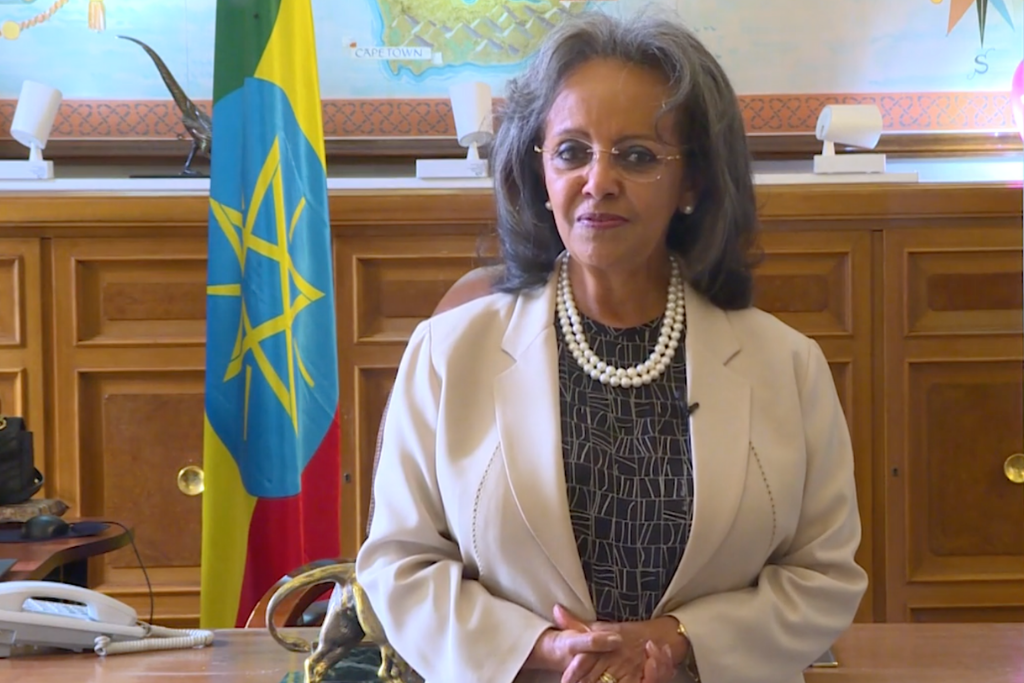Ethiopia likely to get a new president following the recent decision by the Ethiopian parliament to approve the appointment of Taye Astike Selassie, marking the end of President Sahle-Work Zewde’s tenure as the country’s first female head of state. This political shift comes as the 74-year-old Sahle-Work prepares to step down after reportedly growing disillusioned during the latter part of her presidency.
Sahle-Work, appointed in 2018 with the backing of Prime Minister Abiy Ahmed, was hailed as a symbol of progress for gender equality in Ethiopia. However, sources close to her revealed that she had become increasingly unhappy with her role over the past year and had been looking forward to her departure. The announcement of her likely replacement signals a significant change in the Ethiopian political landscape.
Sahle-Work Zewde’s Presidential Tenure
Sahle-Work Zewde’s appointment in 2018 was a milestone for Ethiopia, marking the first time a woman had held the presidency. Although the role is largely ceremonial in Ethiopia—where executive power lies with the prime minister—Sahle-Work was celebrated for her leadership and for bringing attention to gender equality in the country. Her appointment was seen as a progressive move, reflecting Prime Minister Abiy Ahmed’s push for reform and modernization.
During her presidency, Sahle-Work made several calls for peace amid Ethiopia’s complex internal conflicts, including the two-year civil war in Tigray. However, she was often criticized for not speaking out more forcefully on issues like gender-based violence during the conflict. As the country’s political tensions deepened, particularly in the Oromia and Amhara regions, Sahle-Work reportedly grew frustrated with her inability to affect meaningful change.
Political Tensions and Her Departure
Ethiopia likely to get a new president follows reports that Sahle-Work’s relationship with Prime Minister Abiy Ahmed had soured in recent years. Although Abiy initially supported her appointment, which was seen as a significant step for women in Ethiopian politics, tensions have emerged between the two. On Saturday, Sahle-Work posted a cryptic message on social media, suggesting that she had been forced to remain silent on important issues for the past year, further fueling speculation about her dissatisfaction with the position.
Sources close to Sahle-Work have indicated that she had been eagerly awaiting the end of her term, which is set to conclude later this month. While she has not publicly detailed her grievances, it is believed that ongoing conflicts in Oromia and Amhara contributed to her frustration. In Amhara, federal forces have been engaged in a deadly conflict with local militias, resulting in hundreds of deaths and accusations of human rights violations. Sahle-Work’s perceived inability to address these issues may have played a role in her decision to step down.
Taye Astike Selassie: Ethiopia’s New President
With Ethiopia likely to get a new president, the parliament has approved Taye Astike Selassie, the country’s foreign minister since February, to assume the largely ceremonial role. Taye, 68, is a seasoned diplomat with extensive experience, having served in positions at the United Nations and in Egypt. He is seen as close to Prime Minister Abiy, and his appointment is widely considered to align with the prime minister’s political agenda.
Taye was officially sworn in on Monday in front of Ethiopia’s parliament. His appointment has sparked conversations about the country’s political future, especially as Ethiopia continues to face challenges both domestically and internationally. While Taye’s experience and diplomatic background are viewed as assets, his proximity to Abiy has raised questions about the potential for change or continuity in Ethiopia’s leadership style.
Gender Equality and Africa’s Female Leaders
The departure of Sahle-Work Zewde also marks a symbolic shift in African politics. With her exit, Tanzania’s President Samia Suluhu Hassan remains the only female head of state on the continent. Sahle-Work’s presidency had been a point of pride for many Ethiopians, as it demonstrated the country’s commitment to elevating women to positions of leadership. Her replacement, however, represents a return to a male-dominated political structure in Ethiopia.
While Ethiopia likely to get a new president, the legacy of Sahle-Work’s presidency will be remembered for breaking barriers and advocating for gender equality, even if her impact on some of Ethiopia’s most pressing conflicts was limited.
Conclusion: A New Chapter for Ethiopia
As Ethiopia likely to get a new president, the country enters a new chapter in its political history. The appointment of Taye Astike Selassie signals a shift in leadership, though his role remains largely ceremonial. The challenges that Ethiopia faces, from internal conflict to economic instability, continue to loom large. For many, Sahle-Work Zewde’s departure will be seen as the end of an era of symbolic progress for gender equality, while the focus shifts to what the future holds under Taye’s leadership.

As Ethiopia navigates its complex political landscape, both domestically and internationally, the role of the president may continue to evolve in the years to come.
Stay connected to know more on arcnews.online for global news like Ethiopia Likely to Get a New President as Sahle-Work Zewde Prepares to Step Down. For videos updates visit our YouTube. Do subscribe to Arcnews to get latest updates directly in your mail box.
Have A Great Day.


